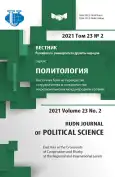Effects of a Threat and Alliance on International Cooperation: Comparison of Inter-Korean and Turkish-Armenian Railway Projects
- Authors: Cho Y.1
-
Affiliations:
- Saint Petersburg State University
- Issue: Vol 23, No 2 (2021): East Asia at the Crossroads of Cooperation and Rivalry at the Regional and International Levels
- Pages: 225-232
- Section: REGIONAL COOPERATION AND INTEGRATION
- URL: https://journal-vniispk.ru/2313-1438/article/view/322118
- DOI: https://doi.org/10.22363/2313-1438-2021-23-2-225-232
- ID: 322118
Cite item
Full Text
Abstract
The article examines restricting factors in international cooperation, drawing a comparative analysis of two cases on cross-border infrastructure projects: the Gyeongui railway line that connects North and South Korea and the Kars-Gyumri-Tbilisi railway line that links Turkey and Armenia. In both cases, states involved strive for the normalization of diplomatic relations and border openness as well as potential economic opportunities and national security. Nevertheless, neither Seoul and Pyongyang nor Ankara and Yerevan succeeded in building a sustainable cooperation framework. While the outcome is the same, independent variables in both cases are different. Firstly, two Koreas have been in a military confrontation for seven decades, whereas Turkey and Armenia never engaged in a direct conflict. Secondly, the configuration of alliances (South Korea and the United States and Turkey and Azerbaijan) weakens the decision-making on the troublesome infrastructure projects. Consequently, alliances are identified as one the key factors that determine the mode of international cooperation.
Keywords
About the authors
Yongsung Cho
Saint Petersburg State University
Author for correspondence.
Email: mirinae2929@gmail.com
ORCID iD: 0000-0003-4032-9727
Postgraduate of Faculty of International Relations
Saint Petersburg, Russian FederationReferences
- Baik, Chang-Jae. (2003). Hegemony and international political economic order: A critical evaluation of hegemonic stability theory. Review of International and Area Studies, 12(1), 1-20 (In Korean)
- Davtyan, V. (2017). Transport and logistic situation in the South Caucasus: Railway wars. Mirovaya ekonomika i mezhdunarodnye otnosheniya, 61(7), 93-100. doi: 10.20542/0131-2227-201761-7-93-100
- Grigoryan, A., Khachatryan, K., & Ter-Matevosyan, V. (2018). Armenia-Turkey border opening: What determines the attitude of Armenians? Caucasus Survey, 7(1), 25-43. DOI: 10.1080/ 23761199.2018.1499298
- Keohane, R. (1984). After hegemony. Princeton: Princeton University Press
- Kim, Ung Jin. (1995). Methodology: Research strategies and design in comparative political inquiry. Cross-Cultural Studies, 2, 89-116 (In Korean)
- Knutsen, T. J. (2014). Halford J. Mackinder, geopolitics, and the Heartland thesis. The International History Review, 36(5), 835-857. doi: 10.1080/07075332.2014.941904
- Przeworski, A. (1970). The logic of comparative social inquiry. NY: John Wiley and Sons
- Suh Bo-Hyuk, Lee Moo Chul. (2018). Status of sanctions against North Korea and prospects for mitigation. KINU Policy Study Series, 18(3). (In Korean)
- Viner, J. (1948). Power versus plenty as objectives of foreign policy in the seventeenth and eighteenth Centuries. World Politics, 1(1), 1-29. DOI: 0.2307/2009156 Walt, S. (1987). The Origins of Alliance. Ithaca: Cornell University Press
Supplementary files









